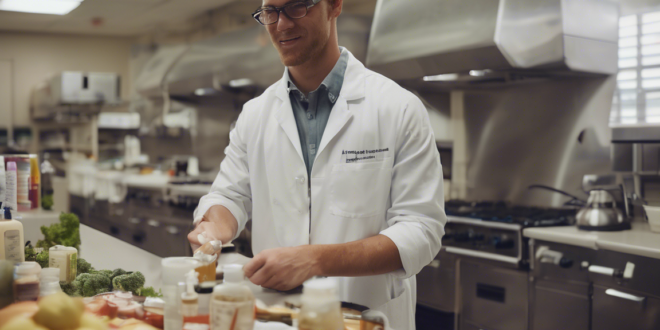From Kitchen to Clinic: How Alabama Medical Students Are Revolutionizing Nutritional Healthcare
In the heart of Alabama, a groundbreaking approach to medical education is transforming how future healthcare professionals understand the critical role of nutrition in patient care. Medical students at the University of Alabama at Birmingham (UAB) are stepping out of traditional classroom settings and into kitchens, learning firsthand about the profound impact of diet on human health.
The Nutrition Revolution in Medical Education
Traditionally, medical training has focused heavily on treating diseases rather than preventing them. However, this innovative program recognizes that nutrition is a fundamental aspect of healthcare that has been largely overlooked in medical curricula. By integrating hands-on cooking classes and nutritional education, these medical students are gaining a holistic understanding of how food directly influences patient health and wellness.
Why Nutrition Matters in Modern Healthcare
Chronic diseases such as diabetes, heart disease, and obesity continue to plague American communities, with diet playing a crucial role in their development and management. The program at UAB aims to equip future doctors with the knowledge and skills to provide comprehensive nutritional guidance to their patients. This approach goes beyond traditional medical training, recognizing that prevention and lifestyle modifications are key to long-term health outcomes.
Inside the Kitchen Classroom
The innovative curriculum involves medical students participating in cooking classes that teach more than just culinary skills. Students learn about:
– Nutrient composition of different foods
– Cultural approaches to healthy eating
– Practical cooking techniques for various dietary needs
– Understanding food’s impact on specific health conditions
Breaking Down Barriers in Patient Education
Many patients struggle to understand how to implement nutritional recommendations in their daily lives. By learning cooking skills themselves, these medical students are developing a more empathetic and practical approach to nutritional counseling. They’re preparing to bridge the gap between medical advice and real-world implementation, making healthcare more accessible and actionable.
The Broader Impact on Healthcare
This program represents a significant shift in medical education. It acknowledges that doctors are not just disease treaters but also health educators. By understanding nutrition at a deeper level, these future medical professionals are positioned to:
– Provide more comprehensive patient care
– Address root causes of chronic diseases
– Develop more personalized treatment approaches
– Reduce healthcare costs through preventative strategies
Challenges and Opportunities
While the program is innovative, it also highlights the current gaps in medical education. Most medical schools still provide minimal nutrition training, typically limited to a few hours of coursework. UAB’s approach demonstrates the potential for a more integrated, holistic approach to medical education that prepares doctors for the complex healthcare challenges of the 21st century.
A Model for Future Medical Training
The success of this program could potentially inspire other medical schools across the United States to reimagine their approach to nutritional education. As healthcare continues to evolve, understanding the intricate relationship between diet, lifestyle, and health becomes increasingly crucial.
Student Perspectives
Medical students participating in the program have reported transformative experiences. Many describe a newfound appreciation for the complexity of nutrition and its direct impact on patient health. One student noted, “This isn’t just about learning to cook. It’s about understanding how food can be medicine, and how we can help patients make meaningful lifestyle changes.”
Looking Ahead: The Future of Nutritional Healthcare
As obesity rates continue to rise and chronic diseases become more prevalent, programs like this become increasingly important. By creating a new generation of doctors who understand nutrition as a fundamental aspect of healthcare, we may be witnessing the beginning of a significant transformation in medical practice.
Conclusion: A Holistic Approach to Medical Education
The University of Alabama at Birmingham’s innovative approach demonstrates that the future of healthcare lies in comprehensive, preventative strategies. By integrating nutrition education directly into medical training, these students are not just learning to treat diseases – they’re learning to promote lasting health and wellness.
As this program continues to grow and potentially inspire similar initiatives nationwide, it offers a promising glimpse into a more holistic, patient-centered approach to medical education and healthcare delivery.
 Good Calories Guide GoodCalories Guide focuses on nutrition, healthy eating, and overall wellness. The site offers practical insights into evidence-based dietary practices, including tips for specific lifestyles such as veganism, keto, and family-friendly meal planning. It also addresses unique nutritional needs for individuals with conditions like diabetes or food allergies, while providing quick and accessible recipes to make healthy living a sustainable and enjoyable choice.
Good Calories Guide GoodCalories Guide focuses on nutrition, healthy eating, and overall wellness. The site offers practical insights into evidence-based dietary practices, including tips for specific lifestyles such as veganism, keto, and family-friendly meal planning. It also addresses unique nutritional needs for individuals with conditions like diabetes or food allergies, while providing quick and accessible recipes to make healthy living a sustainable and enjoyable choice.


